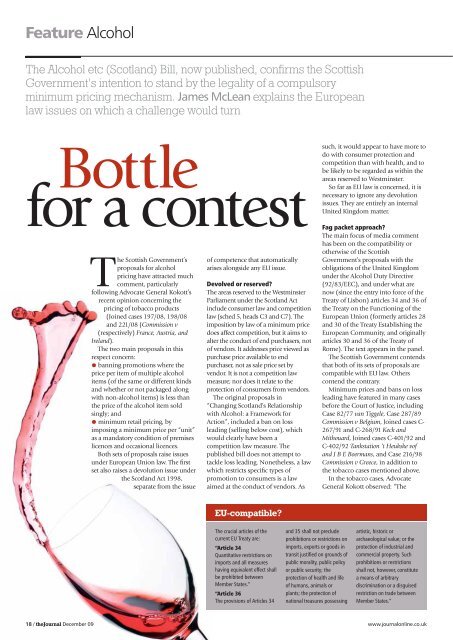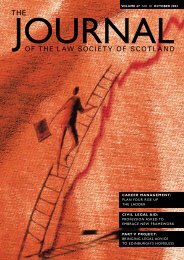Professional briefing - The Journal Online
Professional briefing - The Journal Online
Professional briefing - The Journal Online
You also want an ePaper? Increase the reach of your titles
YUMPU automatically turns print PDFs into web optimized ePapers that Google loves.
Feature Alcohol<br />
<strong>The</strong> Alcohol etc (Scotland) Bill, now published, confirms the Scottish<br />
Government’s intention to stand by the legality of a compulsory<br />
minimum pricing mechanism. James McLean explains the European<br />
law issues on which a challenge would turn<br />
Bottle<br />
for a contest<br />
18 / the<strong>Journal</strong> December 09<br />
<strong>The</strong> Scottish Government’s<br />
proposals for alcohol<br />
pricing have attracted much<br />
comment, particularly<br />
following Advocate General Kokott’s<br />
recent opinion concerning the<br />
pricing of tobacco products<br />
(Joined cases 197/08, 198/08<br />
and 221/08 (Commission v<br />
(respectively) France, Austria, and<br />
Ireland).<br />
<strong>The</strong> two main proposals in this<br />
respect concern:<br />
banning promotions where the<br />
price per item of multiple alcohol<br />
items (of the same or different kinds<br />
and whether or not packaged along<br />
with non-alcohol items) is less than<br />
the price of the alcohol item sold<br />
singly; and<br />
minimum retail pricing, by<br />
imposing a minimum price per “unit”<br />
as a mandatory condition of premises<br />
licences and occasional licences.<br />
Both sets of proposals raise issues<br />
under European Union law. <strong>The</strong> first<br />
set also raises a devolution issue under<br />
the Scotland Act 1998,<br />
separate from the issue<br />
of competence that automatically<br />
arises alongside any EU issue.<br />
Devolved or reserved?<br />
<strong>The</strong> areas reserved to the Westminster<br />
Parliament under the Scotland Act<br />
include consumer law and competition<br />
law (sched 5, heads C3 and C7). <strong>The</strong><br />
imposition by law of a minimum price<br />
does affect competition, but it aims to<br />
alter the conduct of end purchasers, not<br />
of vendors. It addresses price viewed as<br />
purchase price available to end<br />
purchaser, not as sale price set by<br />
vendor. It is not a competition law<br />
measure; nor does it relate to the<br />
protection of consumers from vendors.<br />
<strong>The</strong> original proposals in<br />
“Changing Scotland’s Relationship<br />
with Alcohol: a Framework for<br />
Action”, included a ban on loss<br />
leading (selling below cost), which<br />
would clearly have been a<br />
competition law measure. <strong>The</strong><br />
published bill does not attempt to<br />
tackle loss leading. Nonetheless, a law<br />
which restricts specific types of<br />
promotion to consumers is a law<br />
aimed at the conduct of vendors. As<br />
EU-compatible?<br />
<strong>The</strong> crucial articles of the<br />
current EU Treaty are:<br />
“Article 34<br />
Quantitative restrictions on<br />
imports and all measures<br />
having equivalent effect shall<br />
be prohibited between<br />
Member States.”<br />
“Article 36<br />
<strong>The</strong> provisions of Articles 34<br />
and 35 shall not preclude<br />
prohibitions or restrictions on<br />
imports, exports or goods in<br />
transit justified on grounds of<br />
public morality, public policy<br />
or public security; the<br />
protection of health and life<br />
of humans, animals or<br />
plants; the protection of<br />
national treasures possessing<br />
such, it would appear to have more to<br />
do with consumer protection and<br />
competition than with health, and to<br />
be likely to be regarded as within the<br />
areas reserved to Westminster.<br />
So far as EU law is concerned, it is<br />
necessary to ignore any devolution<br />
issues. <strong>The</strong>y are entirely an internal<br />
United Kingdom matter.<br />
Fag packet approach?<br />
<strong>The</strong> main focus of media comment<br />
has been on the compatibility or<br />
otherwise of the Scottish<br />
Government’s proposals with the<br />
obligations of the United Kingdom<br />
under the Alcohol Duty Directive<br />
(92/83/EEC), and under what are<br />
now (since the entry into force of the<br />
Treaty of Lisbon) articles 34 and 36 of<br />
the Treaty on the Functioning of the<br />
European Union (formerly articles 28<br />
and 30 of the Treaty Establishing the<br />
European Community, and originally<br />
articles 30 and 36 of the Treaty of<br />
Rome). <strong>The</strong> text appears in the panel.<br />
<strong>The</strong> Scottish Government contends<br />
that both of its sets of proposals are<br />
compatible with EU law. Others<br />
contend the contrary.<br />
Minimum prices and bans on loss<br />
leading have featured in many cases<br />
before the Court of Justice, including<br />
Case 82/77 van Tiggele, Case 287/89<br />
Commission v Belgium, Joined cases C-<br />
267/91 and C-268/91 Keck and<br />
Mithouard, Joined cases C-401/92 and<br />
C-402/92 Tankstation ‘t Heukske vof<br />
and J B E Boermans, and Case 216/98<br />
Commission v Greece, in addition to<br />
the tobacco cases mentioned above.<br />
In the tobacco cases, Advocate<br />
General Kokott observed: “<strong>The</strong><br />
artistic, historic or<br />
archaeological value; or the<br />
protection of industrial and<br />
commercial property. Such<br />
prohibitions or restrictions<br />
shall not, however, constitute<br />
a means of arbitrary<br />
discrimination or a disguised<br />
restriction on trade between<br />
Member States.”<br />
www.journalonline.co.uk










